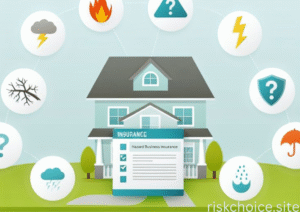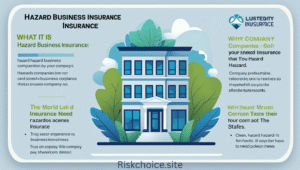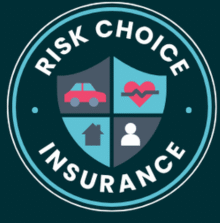
Hazard Business Insurance: What It Is and Why Your Company Needs It Through 2025
Managing a business carries several hazards, including financial, legal, and most importantly physical ones. Hazard business insurance is one of the most valuable but sometimes disregarded security measure a company can afford. Whether you run an office, run a warehouse, or have a retail store, your property runs the danger from fires, storms, vandalism, and other unplanned disasters. Hazard company insurance therefore comes in quite handy.
Everything you need to know about hazard business insurance—what it is, what it protects, who needs it, how much it costs, and how to select the appropriate coverage for your company in 2025 will be covered in this book.
Hazard Business Insurance: Definition
Hazard business insurance, sometimes known as commercial property insurance, is a form of coverage designed to guard a company’s physical assets from harm resulting from dangers including:
Ignition
Hail and storms
Destruction by vandalism
Dishonesty
Exchanges of explosions
Several forms of water damage.
This insurance is meant to pay for the repair or replacement of your building, machinery, inventory, occasionally even other people’s property under your control.
Often included alongside liability coverage and business interruption insurance in a larger business owner’s (BOP) policy is hazard insurance.
Why Should Businesses Get Hazard Insurance?
Imagine a fire damages your store front. You not only lose valuable merchandise but can also have to close while repairs are under progress. Should one lack insurance, the financial load might be disastrous.
Hazard corporate insurance:
Repairs, replacements, and restoration expenses can soon mount up against financial losses.
guarantees business continuity; several policies provide loss-of- income protection should your operations be interrupted.
Many landlords demand that renters carry hazard coverage in line with law or lease requirements.
Being insured tells clients, investors, and partners your company is safe and well-run.
Coverage of Hazard Business Insurance:
Provider and policy will affect the specifics; generally hazard insurance covers harm resulting from:
1. Smoke Damage and Fire
Among the most often occurring risks is Hazard insurance helps cover the losses should a fire start and ruin your building, furniture, or goods.
Particularly windows and roofs, windstorms and hail storms can seriously damage commercial buildings structurally.
3. Vandalsism and Theft
Usually you are covered if someone breaks into your company and takes goods or damages property.
4. Explosion and Lightning
Though infrequent, gas explosions and lightning strikes can be catastrophic. Hazard insurance lessens some of these erratic losses.
5. Aircraft or Vehicle Damage
Usually covered is damage resulting from aircraft or vehicles—that is, from a car running into your building.

Not covered: what is it?
Every conceivable incident is not covered by hazard insurance. Typical exceptions include:
Floods call for special flood insurance.
Earthquakes: Call for different coverage.
Losses resulting from fraud or business owner intentional actions are not covered.
Wear & tear: Typical maintenance and depreciation concerns are not covered.
Covered under workers’ compensation, not hazard insurance are employee injuries.
To know your policy restrictions, always review the fine print or speak with an insurance professional.
Who Needs Business Insurance for Hazards?
Although hazard insurance benefits almost every kind of organization, it is especially important for:
Retail businesses
Restaurants and coffee shops
Manufacturers’ warehouses
Dentists and medical offices
Expert service providers with physical presence.
You might want more hazard coverage than what your homeowner’s insurance provides even if you run a home-based business.
How Much Does Business Hazard Insurance Cost?
Hazard business insurance’s cost changes based on:
Location: Companies in places prone to disasters—such as flood zones or wildfire areas—often pay more.
Type of business: A small accounting firm is less fire risk than a bakery including ovens.
Higher value buildings or pricey equipment call for extra coverage.
Business with past claims could pay more premiums.
Higher deductibles typically translate to reduced monthly rates.
Usually paying between $500 and $1,500 annually for basic hazard coverage, small businesses pay
Offering more general insurance, a packaged BOP (Business Owner’s Policy) may run from $1,000 to $3,000 annually.
To make sure you are getting the greatest pricing for the coverage you require, always compare quotes from at least three different insurers.
Hazard Insurance vs. Other Kinds of Business Insurance
Hazard insurance is straightforward to mix with other types of coverage. The following is a brief overview:
Type of Insurance What Coverage It Provides Hazardious Insurance Physical harm resulting from dangers (fire, storm, theft).
Common Liability Third-party damages to property or injury
Corporate Interruption Income lost brought on by disturbance
Workers’ Compensiveness Work-related employee injuries; commercial auto business cars and associated occurrences
Online Liability Attacks on data systems and breaches
Most companies should have many kinds of insurance for total defense.
How To Select Correct Hazard Business Insurance
Though selecting the appropriate policy can seem daunting, these actions can assist you streamline the process:
1. Determine Your Risk
Based on geography and sector, assess which risks most likely will effect your company.
2. Sort Your Resources.
List all of your physical assets—building, furniture, goods, machinery—so you know which requires protection.
3. Deal with a trusted insurance agent.
An independent broker can assist you in policy comparison and identification of the greatest fit for your requirements.
4. Bundled Policies
For a reduced combined premium, think about a business owner’s policy including liability insurance, hazard insurance, and more.
5. Examine and Update Business has annual needs for change. Make sure your policy changes with you.
Claiming hazard insurance: What should one expect?
Should damage result for your company, use these guidelines to submit a claim:
Record the Damage: As soon as it’s safe, snap pictures and videos.
Notify your insurer right away of the event.
If safe, act to stop more damage—such as covering broken windows.
Document receipts, inventory records, and repair estimates.
An insurance adjuster will review your claim and decide on pay-back.
Typical Mistakes to Steer Clear of
Make sure your coverage shows current values; underinsuring your property.
Not knowing exclusions—take great care reading your coverage.
Not changing coverage following big purchases or renovations.
Ignoring local hazards, if necessary think of separate coverage for floods or earthquakes.
Conclusions
Any company’s risk management plan in the uncertain environment of today depends critically on hazard business insurance. Without it, one fire, theft, or storm might destroy what you have so painstakingly created.
Although it could appear like simply another cost, it is really an investment in the lifetime and stability of your company. Selecting the correct policy, keeping current, and routinely evaluating your coverage can help you to make sure your company is unexpectedly safe.
Get protected now; wait for calamity to strike.
Frequently asked questions
Is legal requirement for hazard insurance?
Although it’s not always legally needed, for business loans or leasing agreements landlords and lenders usually demand it.
Is it possible to write off hazard business insurance on my taxes?
A: Generally speaking, insurance premiums for coverage linked to businesses are tax-deductible.
Q: Suppose I run my company from my house?
Usually not covered by standard homeowner’s insurance is commercial property or liabilities; discuss business-specific riders or policies with an agent.
